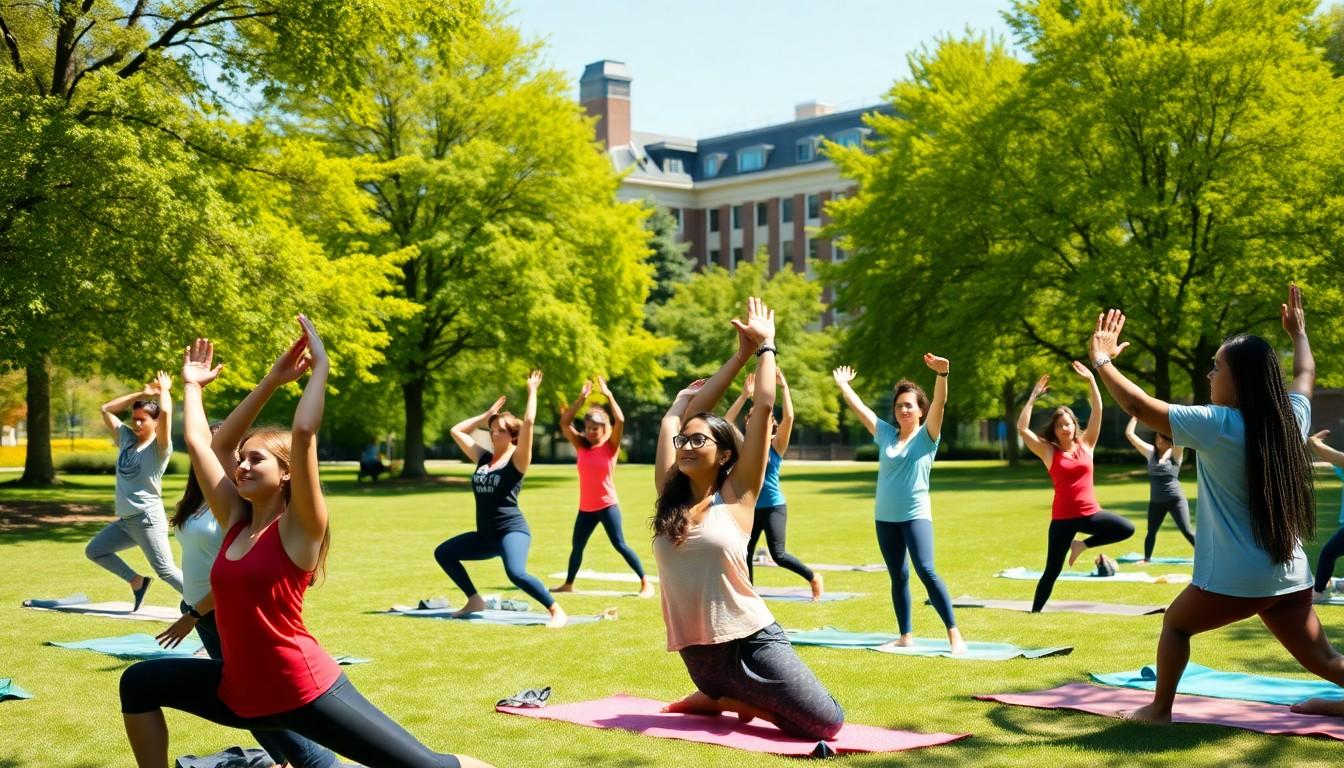At Johns Hopkins University, health and wellness aren’t just buzzwords; they’re a lifestyle. With a campus that buzzes with energy and a community that thrives on support, students and staff alike are discovering that well-being can be both serious business and a whole lot of fun. Imagine a place where yoga classes compete with coffee breaks and mental health workshops are as popular as the latest campus party.
Overview of JHU Health and Wellness
Johns Hopkins University prioritizes a dynamic health and wellness culture, aimed at enriching the lives of students and staff. Resources include comprehensive mental health workshops that address various challenges, fostering resilience and emotional well-being. Fitness opportunities abound through group classes, including yoga, Pilates, and dance, engaging participants in fun and social environments.
Community building stands at the forefront, as social events create connections among various groups. These gatherings promote a sense of belonging and support, essential for personal development. Furthermore, health fairs and informational sessions provide valuable insights into wellness topics, encouraging informed choices about nutrition and physical activity.
Academic support emphasizes the importance of mental wellness alongside physical fitness. Counseling services offer accessible guidance for those navigating stressors related to studies or personal issues. Workshops covering stress management skills and mindfulness techniques enhance coping mechanisms.
Access to facilities contributes significantly to wellness. Students and staff utilize gyms, sports courts, and serene outdoor spaces to decompress and stay active. Recreational sports teams encourage camaraderie and friendly competition, allowing individuals to cultivate friendships through shared interests.
In addition, JHU’s commitment to health extends beyond campuses. Community outreach programs connect students with local initiatives, promoting health education in surrounding neighborhoods. Through these efforts, JHU fosters a holistic approach to wellness, enriching the campus experience and impacting the larger community positively.
Services Offered

Johns Hopkins University offers a variety of services aimed at promoting the health and wellness of its community members. These services address physical health, mental well-being, and nutritional needs.
Physical Health Programs
JHU provides diverse fitness classes and recreational opportunities. Programs include yoga, pilates, and high-intensity interval training, appealing to various fitness levels. Group activities encourage physical engagement while fostering community connections. Students benefit from access to well-equipped gyms and outdoor spaces designed to motivate exercise and relaxation. Regular wellness challenges promote continuous participation and create an active campus. Through recreational sports teams, students develop teamwork skills and friendships, enriching their health journey.
Mental Health Services
A range of mental health services supports the emotional well-being of students and staff. Counseling services offer individual sessions and group workshops designed to address anxiety, stress management, and overall mental health awareness. Peer support programs foster connections among individuals facing similar challenges, creating a sense of belonging. Workshops on mindfulness and coping strategies equip participants with essential tools to navigate personal challenges. The university prioritizes an open dialogue about mental health, removing stigma and encouraging individuals to seek help early.
Nutritional Support
Nutritional support at JHU focuses on promoting healthy eating habits. Access to registered dietitians provides personalized guidance to students seeking to improve their diets. Workshops introduce concepts of balanced nutrition, meal planning, and grocery shopping skills. Collaborations with local farms and markets enhance awareness of fresh, healthy food options. Healthy dining options on campus cater to a range of dietary preferences, ensuring all community members can find suitable meals. Emphasis on nutrition greatly contributes to overall wellness, enhancing both academic and personal success.
Campus Resources
Johns Hopkins University offers extensive resources that promote health and wellness, aiming to support students and staff in their daily lives.
Wellness Centers
Wellness centers play a vital role in providing mental health support. They offer individual counseling and group workshops that address various mental health challenges. Peer support programs also encourage students to connect and share their experiences. Staff members are trained to reduce stigma and promote a culture of openness around mental health issues. These initiatives create a safe space for individuals seeking help, fostering a community that prioritizes emotional well-being.
Fitness Facilities
Fitness facilities at JHU cater to diverse fitness levels and preferences. Fully equipped gyms provide opportunities for strength training and cardio workouts. Group fitness classes, such as yoga, Pilates, and high-intensity interval training, enhance engagement and motivation. Outdoor spaces offer additional options for running, walking, or relaxation. Recreational sports teams promote teamwork and camaraderie, enhancing the social aspect of fitness on campus. Collectively, these offerings encourage students to embrace an active lifestyle while building connections with their peers.
Community Engagement
Johns Hopkins University actively engages the community through various health and wellness initiatives. These initiatives strengthen connections and promote well-being among students and staff.
Events and Workshops
Numerous events and workshops occur throughout the year. Yoga sessions, mindfulness seminars, and fitness challenges cater to diverse interests. Workshops on nutrition provide valuable insights, helping participants adopt healthier eating habits. Regularly scheduled activities foster a sense of belonging and camaraderie within the campus community. They also empower individuals to learn new skills and participate in fun, engaging experiences.
Outreach Programs
Outreach programs play a crucial role in extending JHU’s health and wellness initiatives beyond campus borders. Collaborations with local organizations create opportunities for students and staff to volunteer and support community health efforts. Programs that focus on mental health awareness contribute significantly to reducing stigma in the surrounding neighborhoods. Health fairs and wellness events allow for greater community interaction, fostering a strong support network. Participants gain access to resources that promote healthier lifestyles for everyone involved.
Success Stories
Numerous success stories illustrate the effectiveness of JHU’s health and wellness initiatives. Students often report improvements in their mental health after attending individual counseling sessions, highlighting the supportive environment created. Engagement in group workshops fosters community connections, further enhancing emotional resilience.
Physical wellness programs, such as high-intensity interval training, showcase how varied fitness offerings appeal to all fitness levels. Participants frequently share how these classes help them build camaraderie and achieve personal health goals.
Students and staff alike benefit from nutritional support services. Access to registered dietitians and nutrition workshops enables individuals to make informed dietary choices. Healthy dining options on campus reinforce this commitment to balanced nutrition, leading to better overall health outcomes for everyone involved.
Testimonials collected during wellness fairs exemplify the impact of outreach programs. Community members discuss reduced stigma around mental health thanks to JHU’s initiatives. Collaborative efforts with local organizations strengthen these health initiatives, emphasizing JHU’s dedication to the broader community.
Innovative fitness challenges encourage friendly competition and promote physical activity. Many participants comment on increased motivation derived from team support and camaraderie.
Health and wellness events on campus attract a diverse audience, creating connections among students and staff. Regular yoga sessions and mindfulness seminars provide additional avenues for stress relief and personal growth. Each initiative contributes uniquely to the overall success of JHU’s health and wellness culture.
Conclusion
Johns Hopkins University stands out for its commitment to fostering a health and wellness culture that enriches the lives of students and staff alike. With a blend of serious initiatives and enjoyable activities, it creates an environment where well-being is a shared priority.
The extensive resources available—from mental health support to diverse fitness programs—ensure that everyone has the opportunity to thrive. By promoting community engagement and reducing stigma, JHU not only enhances individual health but also strengthens campus connections.
This vibrant approach to wellness is a testament to the university’s dedication to nurturing both mental and physical well-being, making it a model for other institutions to follow.

